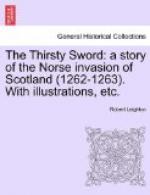But in her despair for herself she yet was comforted by the knowledge that the Earl Kenric had been spared to his people, and that the Norsemen had finally left him in possession of his castle and lands. It was of Kenric that she was now thinking as she sat before the fire. Ever since that night in September, when she had journeyed with him to Gigha, she had felt a strange, close sympathy with him, an affection for him that was stronger than any other feeling she had ever known. Kenric’s peaceful happiness was the one thing that she yearned for.
But now, when she had thought such happiness was surely before him, an unexpected danger had suddenly arisen. Roderic the Rover was still alive. The battle which had brought about the death of so many of his companions had spared him. The raging elements that had destroyed so many of the ships had left Roderic’s galley unharmed. He had voyaged into the far north with the defeated King Hakon, and after Hakon’s death he had returned to Gigha. On any day he might be expected again in Bute.
Aasta had just heard this unwelcome news from a fisherman who had come ashore at Ascog, and she was questioning in her mind how she might profit by the occasion and, unknown to Kenric, go secretly over to Gigha and compass the death of this powerful enemy of Bute. She hated Earl Roderic as the cushat hates the nighthawk, and if by some subtle means she could bring him to his death, then might she deem herself fortunate indeed, and her own life not wholly thrown away by a sacrifice that would be the means of ensuring lasting happiness to the lord of Bute.
A new light beamed in her large eyes as she determined at all hazards to attempt this thing.
Presently she rose from her little wooden stool and took down a heavy cloak that she threw about her shoulders. Then from under a sheepskin mat she drew forth a long sharp dirk, which she placed in her leathern belt. She went further into the cave and put some bread cakes into her wallet. Then drawing aside a curtain that shut off a side chamber in the rocky walls, she held up a lighted cruse lamp and looked for a few silent moments upon the sleeping form of Elspeth Blackfell.
“Fare you well, Elspeth,” she murmured softly. “It may be that I shall never see you again — no, never again. But God will reward you for the great goodness you have shown to your poor Aasta. Fare you well.”
As she sighed and dropped the curtain she turned to leave the cave, and there crept towards her the gaunt form of a great dog wolf, upon whose breast there was a patch of pure white hair. The animal lazily stretched himself and yawned, showing his long red tongue and his white fangs. Aasta bent down and patted his shaggy coat.
“No, Lufa, it is alone I go. Get back to your corner,” she said coaxingly.
The animal turned tail, and with the obedience of a tame dog went back into the darkness and lay down on his mat of sheepskin, while Aasta, drawing her cloak about her, slipped silently out into the clear twilight and faced the keen east wind.




